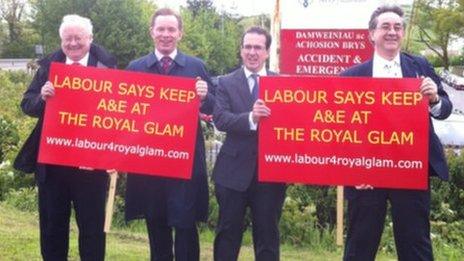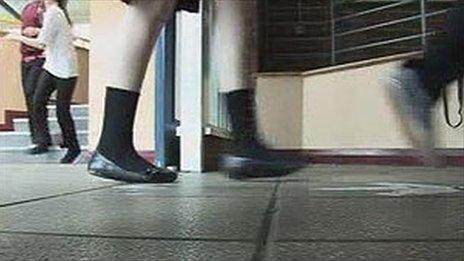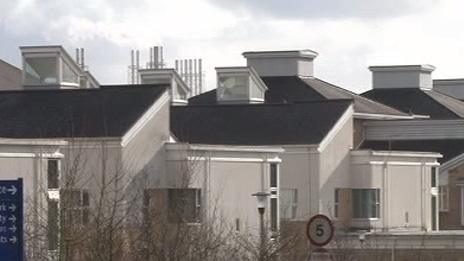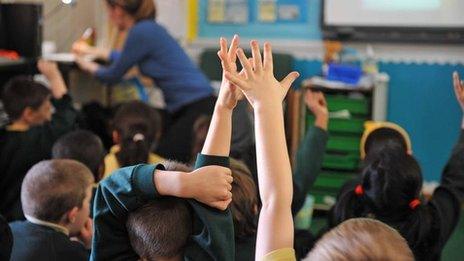Education Minister Leighton Andrews attacked on Pentre school campaign
- Published
Mr Andrews defended his actions in the role of Rhondda AM rather than minister
The education minister has been criticised for backing a campaign to save a school in his constituency which faces closure as a result of his own policy to tackle surplus places.
Leighton Andrews was photographed early this month holding a sign saying "Save Pentre Primary School".
The minister said he was standing up for his constituents as Rhondda AM.
The Welsh Lib Dems said parents in other parts of Wales where schools had closed would be "flabbergasted".
Mr Andrews has repeatedly warned councils across Wales that they must close and amalgamate schools to deal with excess capacity.
Rhondda Cynon Taf council (RCT) has just completed a consultation on closing Pentre Primary School which has just 73 pupils with a capacity of 202 - a 64% rate of unfilled places.
The council says this is the highest rate of all 138 schools in the borough, adding that as a result of a directive from Mr Andrews, it proposes to deal with these surplus places by amalgamating Pentre with nearby Treorchy primary.
However, the minister was pictured holding up a "Save Pentre Primary School" sign during a protest march earlier this month.
He has written a detailed objection to the council's plans for Pentre on the grounds that Welsh government guidance had not been properly followed by the Labour-run council.
Mr Andrews has defended his actions, saying he had intervened acting as a local AM rather than as education minister.
"As assembly member for the Rhondda I have made a very full submission to RCT on this issue," he said.
"I have also attended a public meeting called by the Pentre parents action group, met the action group, and attended their recent demonstration. I have also met parents from Treorchy Primary school who are also affected by the proposal.
"All local authorities, including RCT, have to reduce surplus places. There is clear Welsh government guidance which local authorities have to follow when they propose the closure of any school. My submission questions whether RCT have, in fact, properly followed this guidance.
"I make no apology for standing up for my constituents in the Rhondda."
As minister, Mr Andrews made a decision to halt a primary school closure in Powys last week because the consultation process "should have been better".
Mr Andrews was at the centre of a political row over health two weeks ago when he was rebuked by First Minister Carwyn Jones for using the Labour party's name to oppose potential cuts to specialist accident and emergency services at the Royal Glamorgan hospital in Llantrisant which serves his constituency.
Welsh Liberal Democrat leader Kirsty Williams accused Mr Andrews of repeatedly putting his constituency interest ahead of Welsh government policies - including his own.

Mr Andrews (left) joined fellow Labour politicians Chris Bryant, Owen Smith and Mick Antoniw in a campaign supporting Royal Glamorgan hospital
"Leighton Andrews needs to make a choice about whether he wants to be part of a government which is driving through a policy of centralisation within the health service and wants to see small schools, and schools with surplus places, shut down," she said.
"He has to decide - does he agree with those policies or does he not?
"If he does he should be defending them, and explaining why they're the right thing to do, or perhaps he should consider his position about whether he can campaign more effectively for alternative policies from the backbenches."
She said parents in other parts of Wales which had seen their local schools close under Mr Andrews' surplus places policy would be "flabbergasted and disappointed".
Welsh Lib Dems leader Kirsty Williams says Leighton Andrews is 'not following through on his own policy'
Giving evidence to an assembly committee last year, Mr Andrews said: "Every surplus place in a school is a tax on the head of other pupils within the system, and that needs to be recognised.
"Indeed, we are heading towards 20% surplus places in certain areas, so there are significant challenges that must be addressed by most local authorities."
There were nearly 100,000 surplus places in Wales as of 2011 - a sharp rise from 2006.
The schools inspectorate Estyn has been highly critical of Welsh councils' failure to address the issue of surplus places, and found that RCT had the highest number.
In a report last year it said: "Throughout Wales, school reorganisations have failed to keep pace with falling pupil numbers. In 2011, there were more unfilled places than in 2006 and no local authority has achieved the Welsh government's recommended level of no more than 10% surplus places across primary and secondary schools.
"Although some surplus places have been removed, generally local authorities have been slow to identify and complete projects which would lead to significant savings."
A spokesman for Rhondda Cynon Taf Council said: "Pentre Primary School has the highest percentage of surplus places of any school within Rhondda Cynon Taf and therefore this specific school has to be considered by this local authority if it is to comply with the direction given by the Minister for Education and the Welsh Government."
- Published24 June 2013

- Published10 June 2013

- Published8 May 2012

- Published15 June 2010